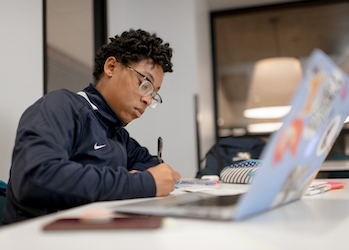- Schedule an Appointment
- Major/Career Exploration
- Internship/Job Search
- Graduate/Professional School
- Year of Service
- Resume and Cover Letter Writing
-
-
HANDSHAKE

-
CONNECT WITH US
-
PROBLEM WITH THIS WEBPAGE?
Report an accessibility problem
To report another problem, please contact career.center@marquette.edu
Pre-Law Guide
The Career Center is available to help you. Our friendly staff have experience working with students and alumni in various stages of considering law school or preparing their applications.
Thinking About Law School?
Explore:
Join Marquette Clubs and Organizations
- Gain Experience through volunteering, internships, part-time Jobs
- Milwaukee Community employers
- Programs—Les Aspin, study abroad, service trips
Learn from Alumni Connections!
- Marquette Career Network
- Faculty and Staff at Marquette
- LinkedIn Alumni
Basic Timeline (Everyone’s experience is different!):
Timeline
- First and sophomore year—join clubs, organizations, informational interviews, take classes for exploration
- Junior—do an internship, informational interviews, start prepping/planning for the LSAT
- Senior—Take the LSAT ideally by December the fall before attendance and get your application in by December/January. Many law schools are rolling admission, so when they have their numbers, it will close
- If you decided to take a gap year or so, plan to take the LSAT in November/December before the fall you would want to apply. Your LSAT is good for five years, so if you want to take it earlier, that is also okay!
Ready to Apply?
Application Materials and Process:
LSAC: The Law School Admission Council Website
- Create Account
- This is where you track and submit things for schools
- You will register for the Law School Admission Test (LSAT) on the LSAC website
- Lots of information about schools, connections, webinars, scholarships, and so on, so you can learn about what you need for Law school!
Application Materials Needed to Apply
- Law School Admission Test (LSAT)
- Personal Statement:
-
- What makes you stand out as a candidate?
- Why law school?
- What experiences make you a strong candidate?
- Why are you applying to _____ law school specifically?
3. Official Transcripts: Ordered from the Registrar
-
- Allow 2 weeks in case they need to be mailed
4. Letters of Recommendation (Typically 2-3)
-
- Professors/faculty
- Advisors
- Student organization advisors
- Previous Supervisors
What is the Law School Admission Test (LSAT), and How Do I Prepare?
LSAT Overview:
- Reading Comprehension (one 35-minute multiple-choice section)
- Analytical Reasoning (one 35-minute multiple-choice section, known as the logic games section)
- Logical Reasoning (one 35-minute multiple-choice sections)
- Experimental Section (one additional 35 minute multiple-choice section from one of the above, not scored)
- Writing (one 35-minute section, unscored but sent to law schools). LSAT Writing is taken separately on-line, on-demand You must install proctoring software on your home computer and take it within one year of your LSAT test date.
LSAT Timeline and Preparation:
Timeline
- Typically take this in the fall of your senior year if you are applying for the following academic year
- Results good for 5-years
Preparing
- LSAC: 4 practice exams
- Average study time is 2-4 months
- Study resources ideas:
-
- Kaplan Test Prep
-
- Blueprint LSAT Prep
-
- LSATMax
-
- Manhattan Prep
-
- Princeton Review
-
- PowerScore
-
- 7Sage
-
- TestMasters
Retaking the LSAT:
Guidelines
- Three times in a single testing year
- Five times within the current and five past testing years (the period in which LSAC reports scores to law schools)
- A total of seven times over a lifetime
Considerations
- Law schools will see all the scores and retakes, so it is important that you do better when you retake. In order to do so, make sure you prepare in advance and take practice tests!
- LSAC Score Preview: Can purchase ahead of exam to preview scores to see if you would want to keep or cancel scores: https://www.lsac.org/lsat/lsat-scoring/lsat-score-preview
- Law schools will see that you canceled, but it is better than showing a lower score, especially after a retake.
What Law Schools Should I Apply To?
Research Schools:
- Typically look at GPA and LSAT score to find tiers of schools you are interested in.
- Create a list that aligns similarly with your scores and GPA, but know that your entire application matters! You could choose schools that align closely, are a little higher, and a little below! This decision can include a lot of factors. Talk to a Career Counselor if you need help!
- There is not the right number of schools to apply to!
- Attend law schools' info sessions—this will help you better understand their school and what they care about and could also waive fees potentially
- Seek Scholarships
What Could I Do in a Gap Year Before Law School?
Opportunities to Consider Before Law School:
Bridge Year Ideas
- Paralegal
- Law/Legal clerk
- Non-profit sector
- Policy work
- Research
- Legal Writing Opportunities
- Law Firm Experience
- Year of Services
- AmeriCorps
- Peace Corps
- City Year
Please note that you will find varying education qualifications listed on job postings for positions like paralegal, legal assistant, legal clerk, and law clerk. If you seek guidance for finding suitable positions, schedule an appointment with a career counselor.
